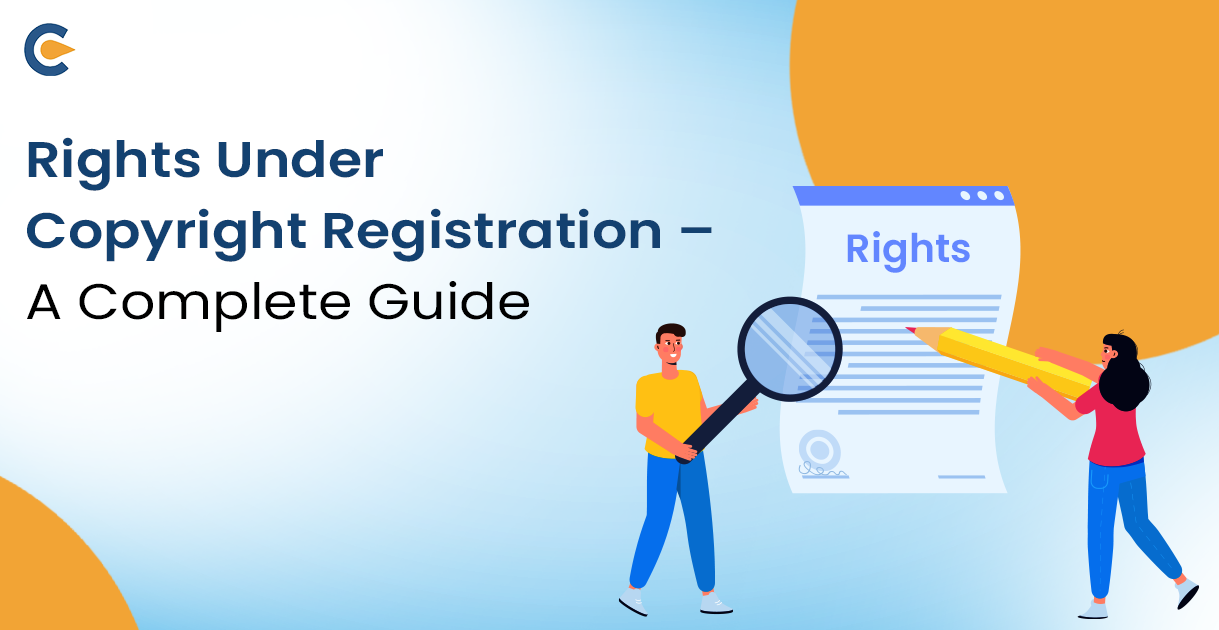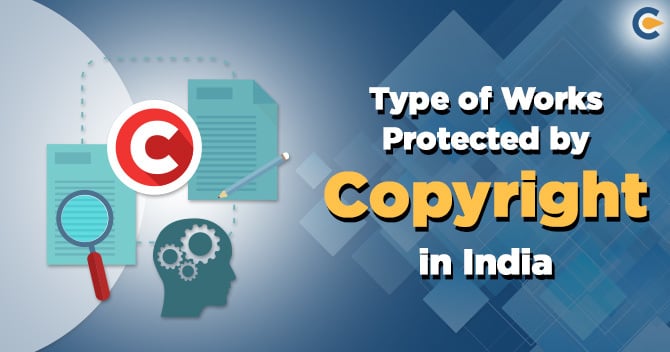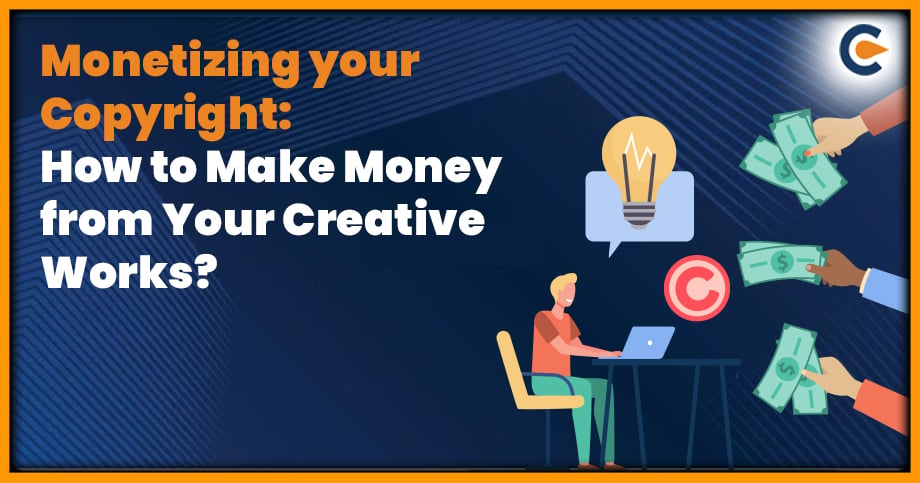A copyright is a statutory right or privilege granted to the owner, maker, composer, curator, etc., of a literary, artistic, musical, dramatic, or cinematographic work that is granted by the Government. A Copyright signifies and ensures that no person other than the original creator shall be allowed to use or exploit the copyright for the purpose of extracting monetary benefits from its use without paying a due royalty amount. If any person makes an unauthorized use of the copyright, it is known as an infringement of copyright, and the person can face imprisonment as well as a fine. The Registration and Rights under copyright registration are governed by the Copyright Act of 1957. Once a copyright is granted, it remains valid for a period of 60 years. After the period of expiry, the copyright becomes a property in public property.
What are the Rights of the Copyright Owner?
Though the law does not make it mandatory to register a copyright in order to claim protection from the statutory regulations, copyright registration can help the creator avoid a number of legal and financial issues that might arise from the infringement of an unregistered copyright in the future. Copyright registration not only grants statutory protection to the creator’s work but also enhances the legitimacy of the work and provides rights under copyright registration in the following ways –
Creates a Public Record of the Work
One of the rights under copyright registration is that a copyright creates public ownership of the literary or artistic work. It becomes available in the public domain and can be searched by anyone lest the copyright is duplicated or infringed upon by someone deliberately. Section 17 of the Act states that, with respect to the copyright, the owner or author of the work shall be its first owner, as mentioned in public records. This not only publicly declares the ownership of the copyright but also creates reliability and brand value of the copyright.
Safeguards the Rights of the Owner
It is important to register a copyright as it prevents unauthorized use by any person or entity. Though copyright registration is not mandatory for the owner of the copyright, it makes it more legitimate and empowers the owner to take legal action against the person who infringes the same. The artist cannot file for infringement of copyright because it is not registered. It serves as prima facie evidence of the ownership of the copyright and hence makes the copyright legally enforceable when its infringement occurs.
Global Protection of the Copyright
International Conventions and treaties such as TRIPS, Berne Convention, WIPO Copyright Treaty, Universal Copyright Convention, etc., accord protection of intellectual and original works to the citizens of member states in all other signatory nations. India has become a member of several of these international conventions, and hence, copyrights registered in India enjoy the same protection worldwide in the countries that are also signatories to these conventions. Hence, Copyright Registration creates the international brand value of the copyright.
Exclusive rights under Copyright Registration
Copyright registration not only makes the work exclusive to the copyright holder but also protects the monetary value attached to the copyright. The owner of the copyright can earn royalty by authorizing others to reproduce, distribute, broadcast, or adapt the work. Hence, the monetary rights under copyright registration are protected by the law.
What Works can be registered under the Copyright Act?
Copyright registration extends protection and the right to exclusive use of a variety of works and intellectual properties. The creator or maker of literary, dramatic, poetic, artistic, cinematographic work, etc., can seek Rights under copyright registration in order to safeguard their original works. The various categories of copyrights are –
1. Literary Works
Literary works that are original or specially made are among the works that are shielded by copyright laws. These creative works include scripts, novels, biographies, theses, technical books, and programs, to name just a few.
2. Artistic Works
Drawing inspiration from the Berne Convention of 1886 and subsequent treaties and conventions on the protection of literary and artistic works, The Copyright Act of 1957 guarantees the Rights of the copyright owner with respect to the protection of artistic creations, which include drawings, paintings, sketches, photographs, schematics, cartoons, models, blueprints, etchings, casts for sculptures, graphics, and drawings.
3. Dramatic Works
The dramatic play, or screenplay of a particular event, story, script, or plot is referred to as a dramatic work. They could include a play, recitation, acting from a book, coordinated gestures, etc. This category of art does not contain cinematographic films of any kind. These rights allow the creator of these dramatic works to duplicate, reproduce, monetize, or make publicly available their original works to any other person or entity.
4. Cinematography Works
Cinematography works refer to any visual work or video recording that is captured or made using a camera device whose resultant footage is that of an image in motion. Video films, movies, animated pictures and movies, short films, and documentaries are all protected by the Copyright Act. Section 26 of the Copyright Act states that Rights under copyright registration are protected for a period of 60 years from the year preceding the year in which the film was released.
5. Sound Works
A sound recording is any recording of an audio composition through instruments or vocals. Sound recordings include podcasts, audiobooks, sound effects, speeches, interviews, etc. If the sound recording includes music, the composer’s consent is required in order to preserve it through Copyright registration. Section 52A of the Copyright Act mandates that the creators’ name, year of publication, title, and address of the copyright holder and information of the record producer shall be printed or mentioned on the sound recording.
6. Musical Works
Similar to sound works, a musical composition refers to any original composition, arrangement, piece, or musical score that gives exclusive rights to the owner or composer to use, distribute, or gain monetary benefit out of commercial exploitation of the work. It includes lyrics, melodies, rhythms, and harmonies. The “composer” is the creator of the copyright relation to “musical works.” The composer of the musical piece must provide the author permission to record a song or musical piece.
7. Technical Drawings and Apparatuses
The law on Copyright registration for technical and mechanical drawings, designs, and blueprints differs from the aspect of Copyright registration. However, the creator of such designs and specifications enjoys privileges at par with Rights under copyright registration. Though designs are separately covered by the Designs Act of 2000, there are certain overlapping elements between copyrights and designs as well. Works such as architectural designs and blueprints, semi-technical drawings, visual representations of internal circuits and structures, and abstract concepts such as machine parts and contraptions that lack any innovative appeal but hold functional value are excluded from registration under the Design Act but are eligible for Copyright registration.
Conclusion
Rights under copyright registration are exclusive monopolistic rights available to a person who creates an artistic, literary, or dramatic work. Copyright registration enables the creator to enforce his/her rights against any infringer or entity that makes unauthorized use of the original work. Rights of the copyright owner are just in rem for the owner or creator of the original work. Even though copyright registration has not been explicitly made mandatory for the creator to avail the benefits of original work, it definitely makes it easier for the copyright holder to prove ownership and legitimacy of their claim. It makes public record of the first owner of a copyright, which is otherwise required to be provided by the claimant.
In today’s time, forgery and delicacy are very common, and infringement of products can be done very easily; copyright registration becomes a must to protect your intellectual property from replication or unauthorized use. Not only does it provide legal backing and a round for seeking damages and remedy if the copyright is unfairly used, but it also enhances the brand value and presence of the product through official recognition.
Frequently Asked Questions
What is a Copyright?
A copyright is a statutory right or privilege granted to the owner, maker, composer, curator, etc. of a literary, artistic, musical, dramatic, or cinematographic work that is granted by the Government. It allows exclusive use, distribution, sale, and assignment of that work to the copyright holder.
What are the Rights under copyright registration of a Copyright Holder?
Copyright Registration allows the copyright holder the right of exclusive use, including sale, distribution, public display, and assignment of the copyright. Such rights are exclusive to the creator of the work and no one else.
What is considered as work under Copyright?
In the context of copyright, work refers to a variety of intellectual creations, such as books, novels, designs, paintings, designs, computer applications and programs, films, cinematography, etc.
What works can be protected under Copyright registration?
The various types of original works that can be protected under copyright registration are literary works, artistic works, dramatic works, cinematographic works, musical works, sound works, blueprints, and designs.
What is the validity of the Rights under copyright registration?
A copyright registration and subsequent rights conferred upon the creator are valid for a period of 60 years plus the death of the copyright holder.
Is copyright registration necessary in order to avail of copyright benefits?
No, however, copyright registration creates a public record of the intellectual property or original work against the entire world. Copyright registration, hence, makes it easier for the copyright owner to claim damages in the future from any person or entity who makes unauthorized use of the work. Copyright regulations, hence, make it easier to prove the original ownership of a work.
Are designs and shapes covered under the Copyright Act?
No, Designs and shapes are protected under the Designs Act of 2000. Rather than protecting original works, the design act covers the appearance and unique design of a product. However, copyrights and designs are of overlapping nature, and sometimes, certain designs can be copyrighted as well, for example, part of a machine that has no aesthetic value but is functionally unique.
Are the rights under copyright registration protected outside India as well?
Yes, India is a signatory to TRIPS, Berne Convention, WIPO Copyright Treaty, Universal Copyright Convention, International Copyright Order, 1999. Hence, the rights available to an artist or creator under the Copyright Act of 1957 are available to foreign works and arts. Therefore, the remedies available in case of infringement of copyright under the Indian Copyright Act are available to international authors and creators and vice-versa as well.
How can Corpbiz help me safeguard my original work under Copyright?
We at Corpbiz are dedicated registration and licensing solutions providers with a dedicated team of experts who look after each and every aspect of your copyright registration process. From Making submissions with the regulatory authority, documentation, and reply to objections, we would ensure that your work is duly copyrighted and prevented from any authorized use or infringement.
Read Our Article: Copyright Registration For Bloggers











